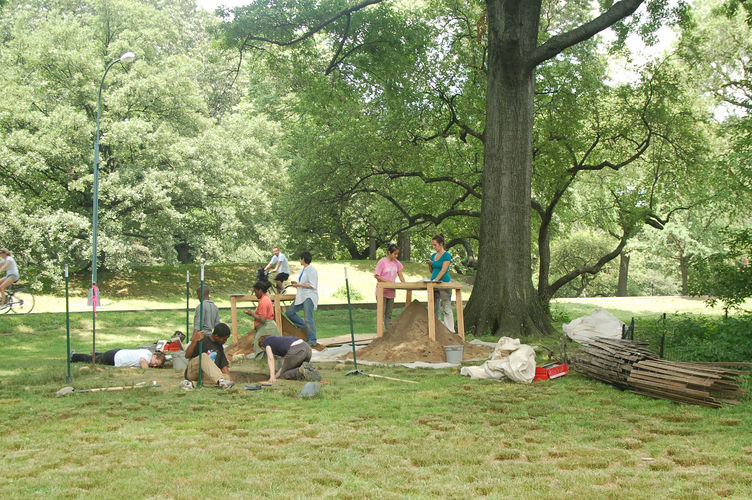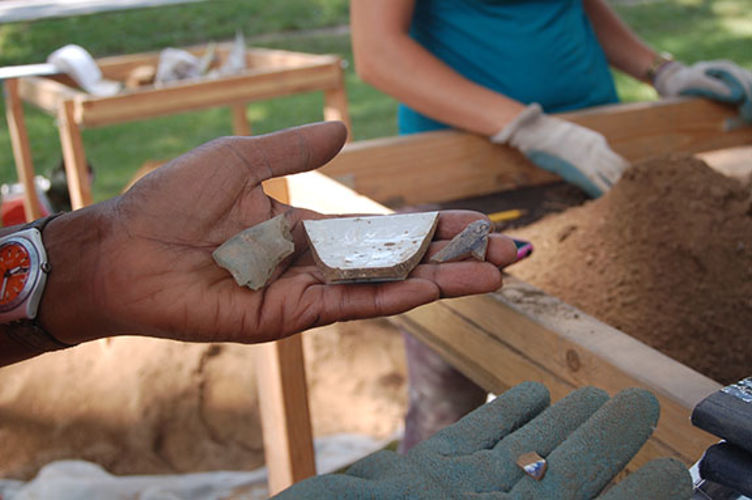We invite you to attend two professional development workshops, one virtual and one in-person, on Seneca Village, the predominantly African American community that the city displaced in 1857 during the construction of Central Park. Educators of all disciplines and grades are welcome! Explore how object and place-based learning can engage young people to see deeply, think critically, and build freely. These workshops are especially useful for educators teaching African American history, New York City history, sociology, biology, and archaeology.
Workshop 1
Saturday, October 2
10 am–3 pm
Spend the morning learning about the ongoing archaeological investigation of Seneca Village—what artifacts reveal about residents’ foodways and the environment of the Village. Alice Baldwin Jones, adjunct assistant professor of anthropology at LaGuardia Community College and William Paterson University of New Jersey, will lead this session.
Later that afternoon, attend a social justice pedagogy workshop that presents principles you can apply to teaching about New York’s African American communities, led by Ama Codjoe, consulting director of equity and inclusion at Bard Graduate Center. Learn where to locate educational resources and book class trips through the Central Park Conservancy; and to close the day, enjoy a poetry writing session facilitated by Bard Graduate Center’s Lab for Teen Thinkers alumni. This workshop is curated by Ama Codjoe and Carla Repice.
This workshop will be held virtually on Zoom using strict security precautions and procedures. A Zoom meeting link and a basic materials list will be emailed at least 24 hours in advance of the workshop.
Register for Professional Development Workshop on Seneca Village: Workshop 2
Meet the facilitators!
Alice Baldwin-Jones, PhD, is an Adjunct Assistant Professor of Anthropology in the Social Science Department at LaGuardia Community College, Long Island, NY. Her research focuses on social justice issues around access and equity to food, education (including nutrition education), land rights, health disparity, and social stratification of the African Diaspora in Belize, Cuba, Jamaica, and the United States; on the indigenous population in Chiapas, Mexico. She is a member of South Orange Baha’i Community.
Ama Codjoe has conducted organizational culture, social justice, and anti-bias trainings for DreamYard Project, The Met Museum, the National Guild for Community Arts Education Leadership Institute (CAELI), and numerous other institutions. Codjoe has served as the Project Manager for Equity in the Panel Process, a national collective of funders pursuing racial equity in grantmaking, and as Visiting Assistant Professor of Social Justice and Inclusion at The New School. Currently, she is the Consulting Director of Equity and Inclusion at the Bard Graduate Center.
Carla Repice was founding staff at the DreamYard Project and taught arts integration, social justice, and arts education in New York City public schools from 1999-2017. In 2007, she founded and was the artistic director of the Bronx Art Collective, a nationally recognized arts and social justice out-of-school program at the DreamYard Art Center. Repice has taught museum education at The City College of New York and led workshops through the U.S. and Europe. Currently, she is the Senior Manager of Education, Engagement and Interpretation at Bard Graduate Center, and an education consultant for the Hill Art Foundation.
This professional development workshop series is held in conjunction with the Lab for Teen Thinkers public humanities program, the Institute for the Exploration of Seneca Village History, and the Central Park Conservancy. Over the past thirty years, many scholars, students, and interested New Yorkers have worked to unearth the history of Seneca Village and the experiences of its residents from archives and artifacts. The Lab for Teen Thinkers builds upon that research and shares insights with community audiences through digital exhibitions and walking tours. See Seneca Village for yourself through the Central Park Conservancy’s virtual and guided walking tours, educational resources, field trips, oral histories and exhibitions. Visit our Seneca Village Site to learn more.
The professional development workshops on Seneca Village were made possible through the generous support of The Pinkerton Foundation.


